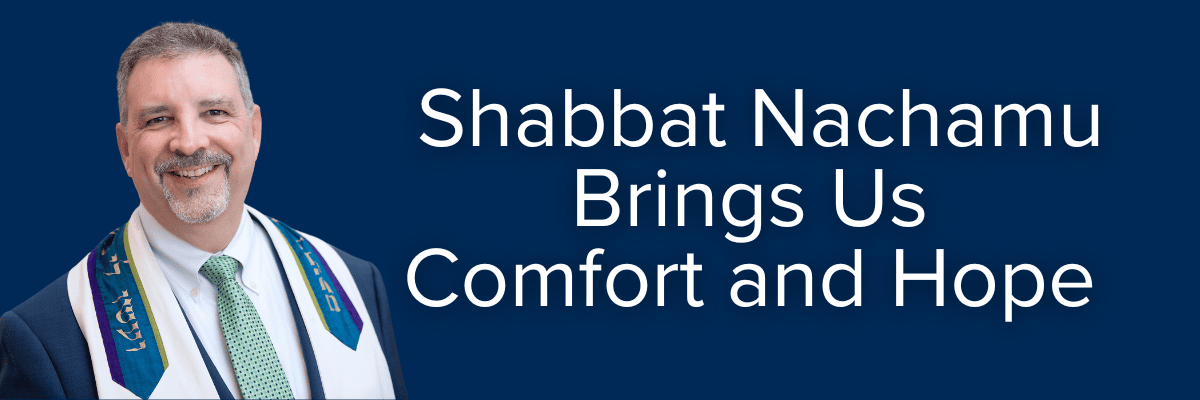Dear Friends,
Shabbat Shalom.
Judaism offers us a way to respond to every human emotion — from joy to sorrow. Each day, our prayers reflect gratitude (like Modim and Shehecheyanu), hope (Amidah), celebration (Hallel), and grief (Mourner’s Kaddish, Psalm 23, Psalm 90). Through prayer and song, we find the language to praise God, to reflect, and to hold on to hope for a better tomorrow.
This Shabbat is one of those powerful moments in our calendar. It’s called Shabbat Nachamu — the Sabbath of Comfort. Coming just after Tisha B’Av, the day we mourn the destruction of the Temple, this Shabbat begins a new season: seven weeks of consolation, leading us to Rosh Hashanah. The name Shabbat Nachamu comes from the opening words of the Haftarah portion from Isaiah (40:1):
“Nachamu, nachamu ami” — “Comfort, comfort My people.”
These words were originally meant to offer strength to a people devastated by loss, but they continue to speak to us today — offering a message of comfort, hope, and resilience as we navigate a challenging and often painful world.
Many of us are watching the news from Gaza and feeling a deep need for that comfort. Whether you support or oppose the Israeli government’s actions — this is a moment when we, as Jews, seek solace and understanding.
At TRS, our congregation includes a wide spectrum of views. Yet, what unites us is our shared care for one another, our collective memory of hardship, and our common hope for peace, justice, and a future free from antisemitism and hate. We embrace the State of Israel as our Jewish homeland, but we wish to live in peace.
Our recent clergy letter about the war against Hamas brought varied responses — some deeply supportive, others deeply critical, and many in between. Disagreement is part of communal life. But so too is our shared longing: not to be victims, not to be aggressors, but to live in peace and self-determination. So this Shabbat, we say: Nachamu, nachamu… comfort us. Give us strength. Let us hold fast to hope.
As Israel’s national anthem, Hatikvah (The Hope), reminds us:
As long as the Jewish spirit is yearning deep in the heart,
With eyes turned toward the East, looking toward Zion,
Then our hope – the two-thousand-year-old hope – will not be lost:
To be a free people in our land,
The land of Zion and Jerusalem.
Let us sing these words with hope and hold fast to Isaiah’s vision and to our own — of comfort, resilience, and a better tomorrow.
Shabbat Shalom,
Cantor Michael Shochet


